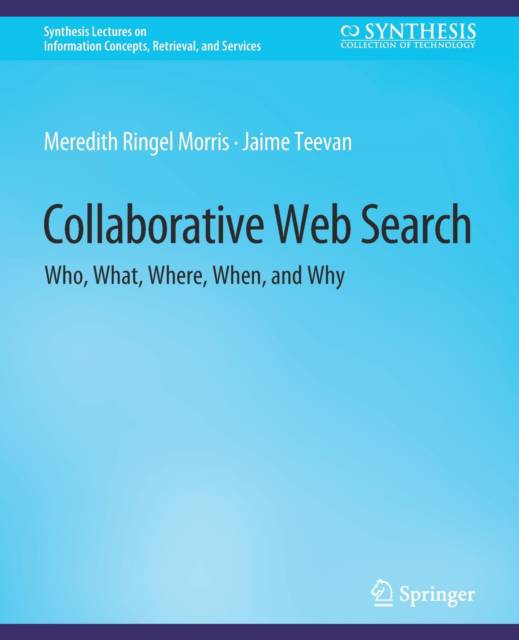
- Afhalen na 1 uur in een winkel met voorraad
- Gratis thuislevering in België vanaf € 30
- Ruim aanbod met 7 miljoen producten
- Afhalen na 1 uur in een winkel met voorraad
- Gratis thuislevering in België vanaf € 30
- Ruim aanbod met 7 miljoen producten
Zoeken
€ 34,95
+ 69 punten
Omschrijving
Today, Web search is treated as a solitary experience. Web browsers and search engines are typically designed to support a single user, working alone. However, collaboration on information-seeking tasks is actually commonplace. Students work together to complete homework assignments, friends seek information about joint entertainment opportunities, family members jointly plan vacation travel, and colleagues jointly conduct research for their projects. As improved networking technologies and the rise of social media simplify the process of remote collaboration, and large, novel display form-factors simplify the process of co-located group work, researchers have begun to explore ways to facilitate collaboration on search tasks. This lecture investigates the who, what, where, when and why of collaborative search, and gives insight in how emerging solutions can address collaborators' needs. Table of Contents: Introduction / Who? / What? / Where? / When? / Why? / Conclusion: How?
Specificaties
Betrokkenen
- Auteur(s):
- Uitgeverij:
Inhoud
- Aantal bladzijden:
- 85
- Taal:
- Engels
- Reeks:
Eigenschappen
- Productcode (EAN):
- 9783031011429
- Verschijningsdatum:
- 18/12/2009
- Uitvoering:
- Paperback
- Formaat:
- Trade paperback (VS)
- Afmetingen:
- 190 mm x 235 mm
- Gewicht:
- 185 g

Alleen bij Standaard Boekhandel
+ 69 punten op je klantenkaart van Standaard Boekhandel
Beoordelingen
We publiceren alleen reviews die voldoen aan de voorwaarden voor reviews. Bekijk onze voorwaarden voor reviews.







